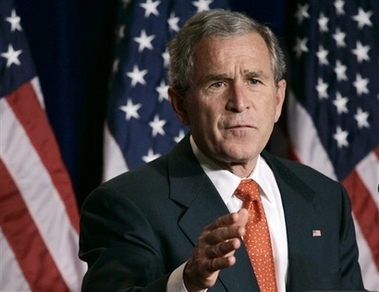WASHINGTON - US President
Bush conceded Friday that "right now it's tough" for American forces in Iraq,
but the White House said he would not change US strategy in the face of
pre-election polls that show voters are upset.
With Republicans anxious about the potential loss of Congress - and with
conditions seemingly deteriorating in Iraq - Bush addressed the question of
whether he would alter his policies.
|

President Bush gestures while speaking at a Republican Party
fund raiser in Washington, Friday, Oct. 20, 2006. In an interview with the
Associated Press, the president acknowledged that 'it's tough' in Iraq and
said he would consult with American generals to see if a change in tactics
is necessary to combat the escalating violence.
[AP]
|
"We are constantly adjusting our tactics so that we achieve the objective,
and right now it's tough, it's tough," Bush said in an Associated Press
interview.
Bush met with Gen. John Abizaid, the top US commander in the Middle East, at
the White House for a half-hour Friday afternoon. The White House said Abizaid
already was in town and Bush asked him over. The president also will consult by
video conference on Saturday with Abizaid at U.S. Central Command in Tampa,
Fla., and with Gen. George Casey, who leads the U.S.-led Multinational Forces in
Iraq, to determine if a change in tactics is necessary to combat the increasing
violence.
Despite calls for change, Bush said, "Our goal has not changed. Our goal is a
country that can defend, sustain and govern itself, a country that which will
serve as an ally in this war. Our tactics are adjusting."
There were fresh signs of Republican doubts about the war. Sen. Kay Bailey
Hutchison (news, bio, voting record) of Texas, who holds a seat deemed safe for
the GOP, said in a campaign debate Thursday she would have voted against the war
had she known ousted Iraqi leader Saddam Hussein possessed no weapons of mass
destruction.
Democrats also kept up the pressure on Bush. In a letter to the president, a
dozen House and Senate Democratic leaders urged him to bring home some U.S.
troops and force the Iraqis to take more responsibility for their security. The
Democrats said Bush should do more to pressure Iraqi leaders to disarm militias
and find a political solution that would curb violence.
"The steadily mounting sectarian violence, growing insurgency and escalating
casualty figures in Iraq are unacceptable and unsustainable," the Democrats
said. "We urge you to change course, level with the American people and join
with us to develop a policy that will work before the situation in Iraq is
irretrievable."
Presidential spokesman Tony Snow said that while Bush might change tactics,
he would not change his overall strategy.
"He's not somebody who gets jumpy at polls," Snow said of Bush.
Bush, at a political fundraiser in Washington for the National Republican
Senatorial Committee, railed against Democrats who criticize the war. Calling
the Democrats the party of "cut and run," Bush said voters need to ask: "Which
political party has a strategy for victory in this war on terror?' "
As of Friday, the US combat death toll in Iraq during October stood at
75 - possibly heading for the highest for any month in nearly two years.
Now in its fourth year, the war has claimed the lives of at least 2,786
Americans. Approval of Bush's handling of Iraq has dipped to 37 percent among
likely voters in the AP-Ipsos poll early this month, down slightly from 41
percent last month.
Defense Secretary Donald H. Rumsfeld said the Iraqi government must become
less reliant on the United States to handle security. He also said US officials
are working with the Iraqis to develop projections on when that might happen.
"It's their country, they're going to have to govern it, they're going to
have to provide security for it, and they're going to have to do it sooner
rather than later," Rumsfeld said.
"The biggest mistake would be to not pass things over to the Iraqis, create a
dependency on their part, instead of developing strength and capacity and
competence," he said.
Doubts about the effectiveness of current tactics have risen, and the US
military has said its two-month drive to crush insurgent and militia violence in
Baghdad has fallen short. Attacks in Baghdad rose by 22 percent in the first
three weeks of the Muslim holy month of Ramadan, compared with the three
previous weeks.
On Friday, the Shiite militia run by the anti-American cleric Muqtada al-Sadr
briefly seized control of the southern Iraqi city of Amarah in one of the most
brazen acts of defiance yet by the country's powerful, unofficial armies. Tom
Casey, deputy spokesman at the State Department, said the United States was
urging the Iraqis to make sure that security in Amarah was returned to the
government.
"The flare-up of violence in Amarah points out that our strategy to quell the
violence in that country is failing," said Rep. Ike Skelton (news, bio, voting
record) of Missouri, the ranking Democrat on the House Armed Services
Committee.